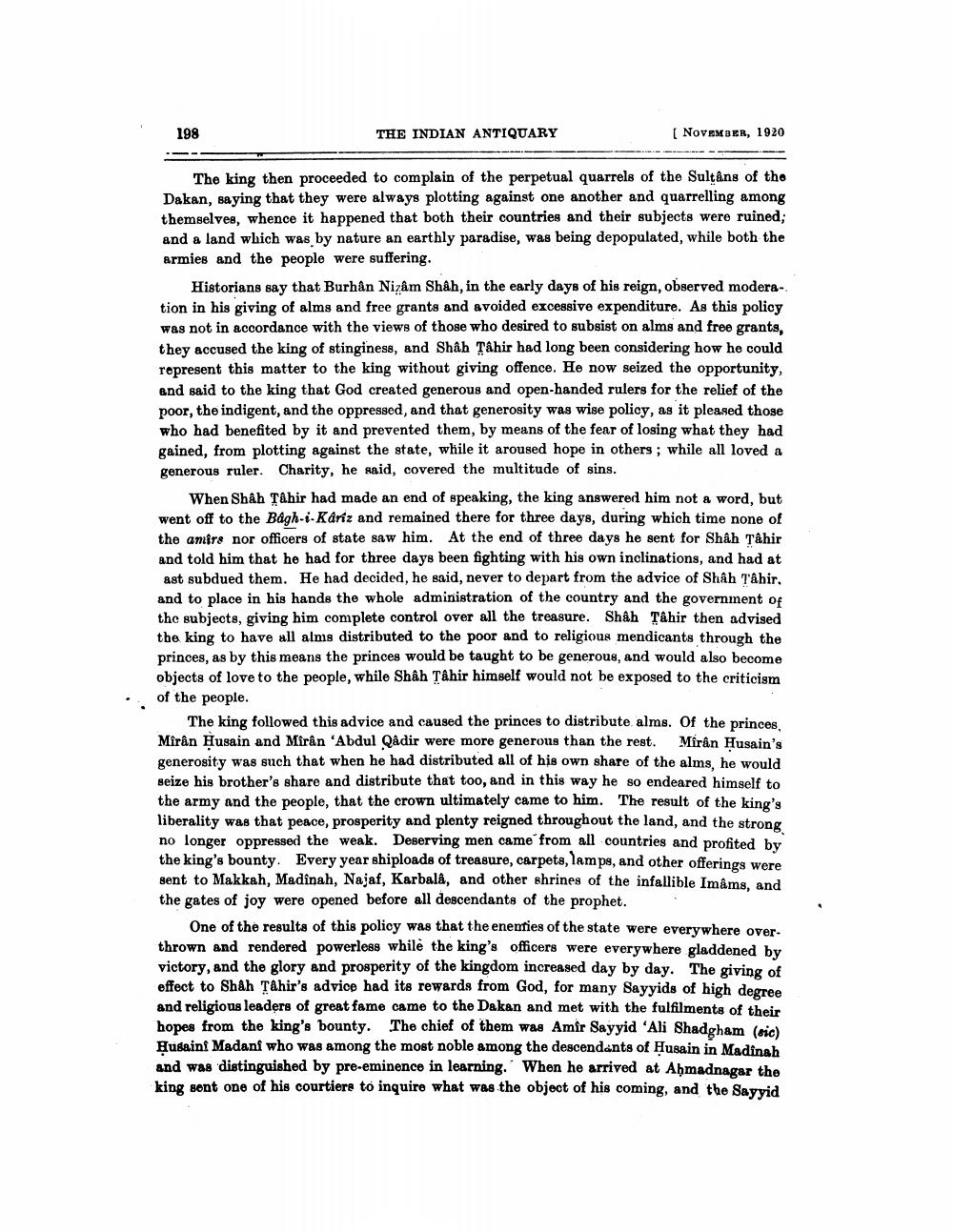________________
198
THE INDIAN ANTIQUARY
[NOVEMBER, 1920
The king then proceeded to complain of the perpetual quarrels of the Sultans of the Dakan, saying that they were always plotting against one another and quarrelling among themselves, whence it happened that both their countries and their subjects were ruined; and a land which was by nature an earthly paradise, was being depopulated, while both the armies and the people were suffering.
Historians say that Burhân Nizam Shah, in the early days of his reign, observed moderation in his giving of alms and free grants and avoided excessive expenditure. As this policy was not in accordance with the views of those who desired to subsist on alms and free grants, they accused the king of stinginess, and Shâh Tâhir had long been considering how he could represent this matter to the king without giving offence. He now seized the opportunity, and said to the king that God created generous and open-handed rulers for the relief of the poor, the indigent, and the oppressed, and that generosity was wise policy, as it pleased those who had benefited by it and prevented them, by means of the fear of losing what they had gained, from plotting against the state, while it aroused hope in others; while all loved a generous ruler. Charity, he said, covered the multitude of sins.
When Shah Tahir had made an end of speaking, the king answered him not a word, but went off to the Bagh-i-Kâriz and remained there for three days, during which time none of the amirs nor officers of state saw him. At the end of three days he sent for Shâh Tâhir and told him that he had for three days been fighting with his own inclinations, and had at ast subdued them. He had decided, he said, never to depart from the advice of Shâh Tâhir. and to place in his hands the whole administration of the country and the government of the subjects, giving him complete control over all the treasure. Shâh Tâhir then advised the king to have all alms distributed to the poor and to religious mendicants through the princes, as by this means the princes would be taught to be generous, and would also become objects of love to the people, while Shâh Tâhir himself would not be exposed to the criticism of the people.
The king followed this advice and caused the princes to distribute alms. Of the princes, Mîrân Husain and Mîrân 'Abdul Qadir were more generous than the rest. Mirân Husain's generosity was such that when he had distributed all of his own share of the alms, he would seize his brother's share and distribute that too, and in this way he so endeared himself to the army and the people, that the crown ultimately came to him. The result of the king's liberality was that peace, prosperity and plenty reigned throughout the land, and the strong no longer oppressed the weak. Deserving men came from all countries and profited by the king's bounty. Every year shiploads of treasure, carpets, lamps, and other offerings were sent to Makkah, Madinah, Najaf, Karbalâ, and other shrines of the infallible Imâms, and the gates of joy were opened before all descendants of the prophet.
One of the results of this policy was that the enenties of the state were everywhere overthrown and rendered powerless while the king's officers were everywhere gladdened by victory, and the glory and prosperity of the kingdom increased day by day. The giving of effect to Shah Tâhir's advice had its rewards from God, for many Sayyids of high degree and religious leaders of great fame came to the Dakan and met with the fulfilments of their hopes from the king's bounty. The chief of them was Amir Sayyid 'Ali Shadgham (sic) Husaini Madani who was among the most noble among the descendants of Husain in Madinah and was distinguished by pre-eminence in learning. When he arrived at Ahmadnagar the king sent one of his courtiers to inquire what was the object of his coming, and the Sayyid




